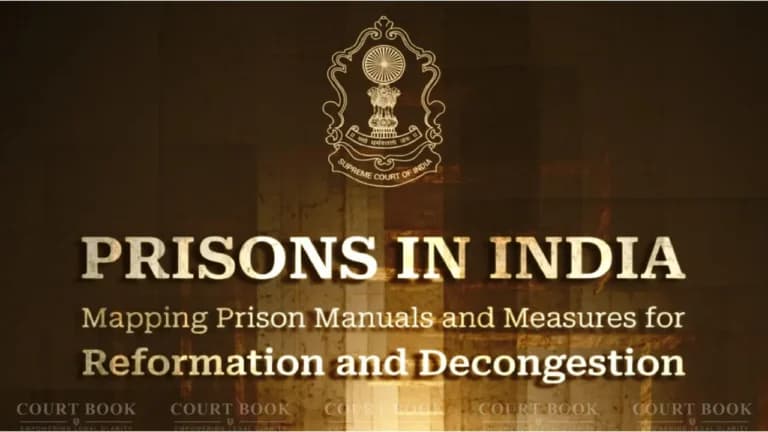On a rather quiet winter afternoon at the Supreme Court, a new report-Prisons in India: Mapping Prison Manuals and Measures for Reformation and Decongestion-was released, and it immediately stirred conversations in the corridors. Prepared by the Centre for Research and Planning (CRP), this revised 2025 edition paints an uncomfortably honest portrait of Indian prisons, often contrasting sharply with our constitutional ideals.
Officials involved in the project described the report as “not just documentation, but a mirror,” and that sentiment echoed through the packed briefing room.
Overcrowding Still Crushing the System
The report opens by stating what many judges have been repeating for years: Indian prisons are bursting. With 131.4% occupancy, the system is visibly strained. In 2022, a massive 75.8% of all inmates were undertrials, meaning three out of four people inside have not been convicted yet.
One senior CRP researcher quietly told journalists, “We cannot talk about reformation when a person hasn’t even been proven guilty but spends years waiting for trial.”
The NCRB numbers included in the report highlight the same-Uttar Pradesh alone accounts for one-fifth of India’s undertrial population.
Caste Shadows Still Linger Inside Prison Walls
Perhaps the most startling section of the document is its frank criticism of continuing caste-linked practices. Several State prison manuals still use phrases like “menial work,” “degrading duties,” “suitable caste,” and “good caste.” In Odisha, even cooking and hospital support work is labelled menial.
The report notes that such language is not just outdated-it institutionalises caste hierarchy. The Supreme Court’s 2024 judgment in Sukanya Shantha v. Union of India had already struck down these provisions, directing all States to revise their manuals. But the CRP warns that implementation is patchy at best.
Read also:- Madhya Pradesh High Court Flags 30-Year Delay, Directs Fresh Hearing Before Removal of Alleged Encroachment
A CRP official remarked during the briefing, “Removing a line from a rulebook is easy. Removing a mindset from an institution takes much longer.”
Mental-Health Crisis Inside Prisons
The report also reveals that initial screening forms do not include dedicated mental-health assessment columns. Even more worrying, jail medical officers in many States have not received basic training mandated by the Mental Healthcare Act, 2017.
NHRC advisories require both a doctor and a psychologist to sign intake screening reports, yet most States fall short.
One passage bluntly notes that 55,502 prisoners reported substance-abuse issues in 2023-an alarming number without adequate de-addiction facilities.
Women Prisoners Face Unique, Often Ignored Challenges
The report highlights that 80.2% of women prisoners are of menstruating age. Yet many prisons limit menstrual supplies or rely on manual pit systems for disposal. Kerala is one of the few States encouraging menstrual cups.
More critically, reproductive rights-including access to abortion-are not clearly provided in most prison manuals, leading to delays in time-sensitive decisions.
Bail: Still the Exception, Not the Rule
Another tough statistic stood out:
- 32.3% bail rejection rate in Sessions Courts
- 24,879 people still stuck in jail despite being granted bail due to inability to furnish sureties.
The report calls for wider use of personal bonds, cash surety, and socio-economic assessments, noting that poverty should not be a life sentence.
Read also:- Himachal Pradesh High Court Rejects Bid for Secondary Evidence in Long-Pending Tenancy
Court’s Push for Reformation, Not Revenge
The report ends by reiterating something Justice Krishna Iyer once said and which is quoted upfront: “To improve prison conditions does not mean making prison life soft, but human and sensible.”
In its final sections, the report stresses the need for uniform standards, better legal aid, functional open prisons, and responsible use of technology-not intrusive surveillance like electronic monitoring that may violate privacy.
The Court’s Direction
The Supreme Court’s direction remains clear:
State governments must revise their prison manuals, correct discriminatory provisions, strengthen mental-health systems, and meaningfully work toward decongestion and reformation.
And with that, the report ends-not with celebration, but with an urgent call to action.
Document Title: Prisons in India: Mapping Prison Manuals and Measures for Reformation and Decongestion
Prepared By: Centre for Research & Planning (CRP),
Supreme Court of India
Document Type: Research Report / Policy Analysis Report
Publication Date: November 2025 (Revised Edition)















